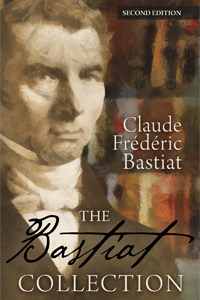
The Bastiat Collection
Claude Frédéric Bastiat was an economist and publicist of breathtaking intellectual energy and massive historical influence. He was born in Bayonne, France on June 29th, 1801. After the middle-class Revolution of 1830, Bastiat became politically active and was elected Justice of the Peace in 1831 and to the Council General (county-level assembly) in 1832. He was elected to the national legislative assembly after the French Revolution of 1848.
Bastiat was inspired by and routinely corresponded with Richard Cobden and the English Anti-Corn Law League and worked with free-trade associations in France. Bastiat wrote sporadically starting in the 1830s, but in 1844 he launched his amazing publishing career when an article on the effects of protectionism on the French and English people was published in the Journal des Economistes which was held to critical acclaim.
The bulk of his remarkable writing career that so inspired the early generation of English translators—and so many more—is contained in this collection.
If we were to take the greatest economists from all ages and judge them on the basis of their theoretical rigor, their influence on economic education, and their impact in support of the free-market economy, then Frédéric Bastiat would be at the top of the list.
As Murray N. Rothbard noted: “Bastiat was indeed a lucid and superb writer, whose brilliant and witty essays and fables to this day are remarkable and devastating demolitions of protectionism and of all forms of government subsidy and control. He was a truly scintillating advocate of an untrammeled free market.”
This book bring together his greatest works and represents the early generation of English translations. These translators were like Bastiat himself, people from the private sector who had a love of knowledge and truth and who altered their careers to vigorously pursue intellectual ventures, scholarly publishing, and advocacy of free trade.
Thus does this collection, totaling 1,000 pages plus extensive indexes, represent some of the best economics ever written. He was the first, and one of the very few, to be able to convincingly communicate the basic propositions of economics.
The vast majority of people who have learned anything about economics have relied on Bastiat or publications that were influenced by his work. This collection—possibly more than anything ever written about economics—is the antidote for economic illiteracy regarding such things as the inadvisability of tariffs and price controls, and everyone from the novice to the Ph.D. economist will benefit from reading it.
The collection consists of three sections, the first of which contains his best-known essays. In That Which is Seen, and That Which is Not Seen, Bastiat equips the reader to become an economist in the first paragraph and then presents the story of the broken window where a hoodlum is thought to create jobs and prosperity by breaking windows. Bastiat solves the quandary of prosperity via destruction by noting that while the apparent prosperity is seen, what is unseen is that which would have been produced had the windows not been broken.
Professor Jörg Guido Hülsmann credits Bastiat for discovering the counterfactual method, which allowed Bastiat to show that destruction (and a variety of government policies) is actually the path to poverty, not prosperity. This lesson is then applied to a variety of more complex cases, after which the reader will never be able to deny that scarcity exists and will always—hopefully—remember that every policy has an opportunity cost. If nothing else, they will not believe—as is often claimed—that earthquakes, hurricanes, and wars lead to prosperity.
The remaining essays cover the important institutions of society—law, government, money, and capital—where Bastiat explains the nature of these institutions and disabuses the reader of all the common misconceptions regarding them.
The second section is Bastiat’s Economic Sophisms, a collection of 35 articles on the errors of protectionism broadly conceived. Here Bastiat shows his mastery of the methods of argumentation— using basic logic and taking arguments to their logical extreme—to demonstrate and ridicule them as obvious fallacies. In his Negative Railroad Bastiat argues that if an artificial break in a railroad causes prosperity by creating jobs for boatmen, porters, and hotel owners, then there should be not one break, but many, and indeed the railroad should be just a series of breaks—a negative railroad.
In his article An Immense Discovery! he asks, would it not be easier and faster simply to lower the tariff between points A and B rather than building a new railroad to transport products at a lower cost? His Petition of the Candlemakers argues in jest that a law should be passed to require that all doors and windows be closed and covered during the day to prevent the sun from unfairly competing with the makers of candles and that if such a law were passed it would create high-paying jobs in candle and candlestick making, oil lamps, whale oil, etc. and that practically everyone would profit as a result.
The third section is Bastiat’s Economic Harmonies which was hastily written before his death in 1850 and is considered incomplete. Here he demonstrates that the interests of everyone in society are in harmony to the extent that property rights are respected. Because there are no inherent conflicts in the market, government intervention is unnecessary. Here we find a powerful but sadly neglected defense of the main thesis of old-style liberalism: that society and economy are capable of self-management. Unless this insight is understood and absorbed, a person can never really come to grips with the fundamental meaning of liberty.

